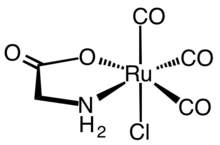Tricarbonylchloroglycinatoruthenium(II) is an organoruthenium complex with the formula RuCl(H2NCH2CO2)(CO)3. A yellow solid, it is an amino acid complex consisting of an octahedral complex with three carbonyls, chloride, and bidentate glycinate ligands. The CO ligands are arranged in a facial geometry. The complex is prepared by treating dichlororuthenium tricarbonyl dimer with sodium glycinate.[1] The complex has attracted attention as a CO-releasing molecule ("CORM").[2][3]

| |
| Names | |
|---|---|
| Other names
CORM-3
| |
| Identifiers | |
3D model (JSmol)
|
|
| ChemSpider | |
PubChem CID
|
|
| |
| |
| Properties | |
| C5H4ClNO5Ru | |
| Molar mass | 294.61 g·mol−1 |
| Appearance | yellow solid |
Except where otherwise noted, data are given for materials in their standard state (at 25 °C [77 °F], 100 kPa).
| |
References
edit- ^ Clark, James E.; Naughton, Patrick; Shurey, Sandra; Green, Colin J.; Johnson, Tony R.; Mann, Brian E.; Foresti, Roberta; Motterlini, Roberto (2003). "Cardioprotective Actions by a Water-Soluble Carbon Monoxide–Releasing Molecule". Circulation Research. 93 (2): e2-8. doi:10.1161/01.RES.0000084381.86567.08. PMID 12842916. S2CID 784328.
- ^ Santos-Silva, Teresa; Mukhopadhyay, Abhik; Seixas, João D.; Bernardes, Gonçalo J. L.; Romão, Carlos C.; Romão, Maria J. (2011). "CORM-3 Reactivity toward Proteins: The Crystal Structure of a Ru(II) Dicarbonyl−Lysozyme Complex". Journal of the American Chemical Society. 133 (5): 1192–1195. doi:10.1021/ja108820s. PMID 21204537.
- ^ Urban, Reinhold; Krämer, Roland; Mihan, Shahram; Polborn, Kurt; Wagner, Barbara; Beck, Wolfgang (1996). "Metal complexes of biologically important ligands, LXXXVII α-amino carboxylate complexes of palladium(II), iridium(III) and ruthenium(II) from chloro-bridged ortho-metallated metal compounds and [(OC)3Ru(Cl)(μ-Cl)]2". Journal of Organometallic Chemistry. 517 (1–2): 191–200. doi:10.1016/0022-328X(96)06166-9.